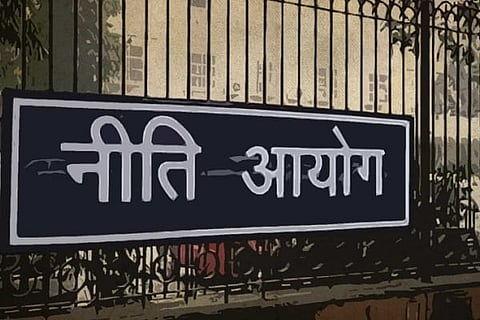
- News Updates
- PSU Watch
- Defence News
- Policy Watch
- हिन्दी न्यूज़
- Jobs Watch
- States News
- Event News

New Delhi: Government think-tank NITI Aayog on Wednesday said that India has a technology stack to facilitate digital banks and there is need for creating a regulatory framework for promoting this.
In its report titled 'Digital Banks: A Proposal for Licensing & Regulatory Regime for India', the think-tank makes a case and offers a template and roadmap for a digital bank licensing and regulatory regime for the country.
India's public digital infrastructure, especially Unified Payments Interface (UPI) has successfully demonstrated how to challenge established incumbents, it said, adding that UPI transactions measured have surpassed Rs 4 trillion in value.
"Aadhaar authentications have passed 55 trillion. Finally, India is at the cusp of operationalising its own open banking framework. These indices demonstrate India has the technology stack to fully facilitate DBs," the report said.
"Creating a blueprint for digital banking regulatory framework and policy offers India the opportunity to cement her position as the global leader in Fintech at the same time as solving the several public policy challenges she faces," it added.
The report suggested the introduction of a restricted Digital Business bank licence and a restricted Digital Consumer Bank licence.
The applicant acquiring this restricted license enlists in the regulatory sandbox and commences operations as a Digital Business bank/Digital Consumer bank as the case may be, in the sandbox, it said.
Contingent on satisfactory performance of the Licensee in the sandbox, the restrictions can be relaxed when the entity graduates from the sandbox and becomes a full-scale DB, it said.
On the capital requirement, the report said Digital Business bank may be required to bring in Rs 20 crore of minimum paid-up capital in the restricted phase. Upon progression from the sandbox a full-scale Digital Business bank will be required to bring in Rs 200 crore.
The methodology for the licensing and regulatory template offered by the report is based on an equal-weighted digital bank regulatory index'.
This comprises of four factors entry barriers; competition; business restrictions; and technological neutrality. The elements of these indices are mapped against the five benchmark jurisdictions of Singapore, Hong Kong, United Kingdom, Malaysia, Australia and South Korea.
On the cyber risk, the report said, as is with the existing challenges being faced by traditional brick and mortar banks which have gone through the digital route like net banking, the prospective digital banks face similar challenges in the internet paradigm in the form of a myriad of cyber attacks like Phishing, Malware, Spyware etc.
The report also maps prevalent business models in this domain and highlights the challenges presented by the partnership model' of neo-banking which has emerged in India due to a regulatory vacuum and in the absence of a digital bank licence.
The report said estimates indicate that DBs have high-cost efficiency.
It also noted that the prevalent neo-bank business model in India is a function of a regulatory vacuum.
Last year, NITI Aayog released a discussion paper on the subject for wider stakeholder consultations.
"The report highlights the promise that full-stack digital banks hold as a potential solution for the persistent policy challenge of credit deepening. It is the next stage of financial inclusion," NITI Aayog vice chairman Suman Bery said.
Technology and increased digitalisation are bound to be disruptive for the incumbents impressing the need to provide a level playing field between different business entities for holistic growth of the sector, he said.
The Digital Bank licensing and regulatory framework proposed by Niti Aayog in this Report is a bold initiative towards that inevitable digital future, said NITI Aayog CEO Parameswaran Iyer said.
(With agency inputs)
(PSU Watch– India's Business News centre that places the spotlight on PSUs, Bureaucracy, Defence and Public Policy is now on Google News. Click here to follow. Also, join PSU Watch Channel in your Telegram. You may also follow us on Twitter here and stay updated.)
